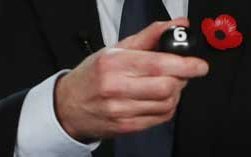EFL chief executive Shaun Harvey has said that the revamped EFL Trophy continues to have a future for League One and Two clubs in the coming years.
With plenty of criticism for the competition and falling attendances following the introduction of Category One academies into the mix this season, with so much over promotion on ‘bring through the youth’ as the catch all excuse for all, the very fact that Academy One sides were playing 30 year old internationals yet the likes of Luton Town were fined FOR playing younger players – well the whole thing has more often than not been a complete farce.
I made my thoughts more than clear last December in this piece for anybody whose interested but with the Wembley final now almost with us and Coventry City and Oxford United battling that one out, Harvey has been back in front of the media and he told the BBC that for him the ‘pilot’ was ‘certainly worth doing’ this year.
Let’s not forget that one of the other selling points for the Football League was that they had no major sponsor of the competition with Johnstone’s Paint backing out after a decade of involvement so the guaranteed Premier League million was to offset that.
It’s now known as the Checkatrade Trophy as an aside.
‘Ultimately the comparison was a competition previously where clubs were as interested in getting knocked out in the first round as they were in getting to the final. That can’t bode well for the longevity of the competition. What we have created gives us a real opportunity of using this competition for the benefit of our clubs, the benefit of young players in this country and, as we will see on Sunday, the benefit of in excess of 70,000 fans hoping to cheer their side to victory.’
Many League One and Two clubs would argue with the sentiment of being interested in being knocked out at the first round, but with a restrictive selection policy for teams clearly a league campaign takes on greater significance, but again we hear about the ‘benefit of young players’ with member clubs fined for more than honouring the spirit of the youthful element the competition was sold on.
And here we seem to get to the crux of the longstanding real argument from the Football League which exists outside of the stated PR angles.
Harvey knows that it would’ve been better had those who turned the offer down – Arsenal, Liverpool, Manchester City, Manchester United, Newcastle United and Tottenham Hotspur all skipped on the invite, and with lower attendance levels Harvey believes had they taken part attendances would’ve been greater.
I’m sure everybody who didn’t attend the competition this year, and made their thoughts clear on social media would’ve all snapped up tickets to see unknown youth players (assuming of course those identified big name clubs honoured the spirit of the ‘youth’ angle.
Because those who took part, well few did and even playing ‘names’ didn’t appeal to League One and Two fans either.
‘There is no doubt this competition would benefit from the more senior, higher-profile clubs playing in it next year. They will make their own choice. The support we have had from the Category One clubs that did compete will make it a lot easier for those clubs to join next season when they can see, very clearly, the benefits that come from competing.’
Benefits for the big boys, yes Mr Harvey finally we’re being clear about it. Benefits for League One and Two clubs and their best chance of Wembley success – nah fine them because we have to take care of the big boys don’t we because we want a slice of that cash.
April 11 will see the Football League member clubs made a decision on the future of the competition for 2017/18 but we know what the Football League will argue itself don’t we. They’ll be wanting another seven figures from the top flight, but I just wonder if any League One and Two clubs will draw a line in the sand this year having now trialled it and refuse to take part.
The BBC pulled the statistics together for the 2016/17 trial.
27% of players who started EFL Trophy matches were English under-21s (up from 23% in 2015-16, and 18% in 2014-15).
62 English under-21 players started three or more games for the 16 invited teams.
League One and League Two clubs have received more than £1.5m in prize money, compared with £478,000 in 2015-16.
Average attendances up to and including the semi-finals fell to 1,404 (from 3,221 in 2015-16).
A crowd of 274 watched West Brom’s team lose at home to Gillingham on 8 November, the lowest crowd in this season’s competition.
Sponsorship income has risen by 35%.
In November, 12 EFL clubs were fined for making too many changes to their EFL Trophy starting line-ups during the group phase. Luton – who reached the semi-finals – were fined £15,000 despite winning two of their three matches.
Pressed on falling attendances, Harvey admitted that was a disappointment but it was hardly a surprise given the backlash in the fanbase and the social media campaigns and whilst there’s more of an acknowledgement that for some fans it was simply a step too far, there’s still a push for finding excuses rather than addressing the issues.
‘Some were exceptionally disappointing. Some of that was due to the speed it was put into format. Some of it was uncertainty about whether it was the thin end of the wedge in terms of trying to get B teams into the established league programme. There was never a suggestion, from anybody at the EFL, Premier League or the Football Association, that this was a precursor to that. Even with the Champions League there is often reference in the media to meaningless games in the group stages. We created group football in a competition that has not got the same profile as the Champions League. Yet we seem to have been set upon for creating this competition that nobody wanted. The reality is the competition was in decline. We have tried to do something to reinvigorate it. We believe we have.’
Of course the issue of fining League One and Two clubs for more than complying with the spirit that the competition was sold on came up, and Harvey thankfully didn’t seem to completely miss the point this time.
‘If we hadn’t had some form of restriction around the strength of teams our clubs could play, it would have been like another version of the Youth Cup or of a reserve team league. There is an age-old debate about whether you should be fined for playing a weakened side if you win. In the review of this competition, we have accepted we have to look at the definition of ‘full-strength sides’. We didn’t actually fine clubs for playing younger players. We fined them for not playing enough senior ones.’
So they were fined for playing younger players then in place of senior players…come on, make a good step forward, don’t think everybody reading or listening to your words has an IQ of 5.
Clearly the competition in its current guise continues to be favoured by the Football League.
‘It is a concern there is great talent in this country that is not getting an opportunity to experience senior football as early as a lot of clubs would want. Let’s be under no illusions. The EFL Trophy, on its own, is not the answer. But I certainly think it is a big part. What goes alongside it is a manager like Claude Puel at Southampton, who rather than play players out of position, has chosen to give young players a chance, having seen them come through, not just in the academy but also in a real game situation, where winning does matter.’
And should the EFL Trophy now be run in 2017/18 on that exact basis – minutes for younger players to the benefit of all clubs involved and not just the Category One rebranded ones – then I would imagine more fans of League One and Two clubs might in fact be willing to give it a shot.
Credit where it’s due though as I’ve certainly not been alone in my criticism this season, at least acknowledging some of the main talking points like the ‘fine issue’ is a step forward and the Football League need to be commended for being open to change on that front.
Now they have the choice to be commended for making real change on that front which gives more choice and freedom back to League One and Two sides so they benefit just as much as the Category One clubs from their involvement.
Share this article




